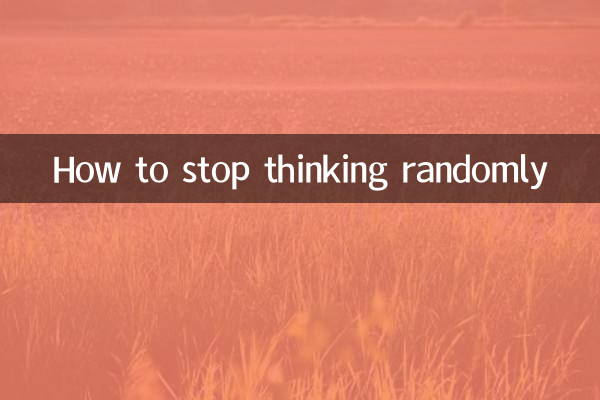How to stop thinking randomly
In an era of information explosion, our attention is easily distracted by various hot topics and content on social media, leading to random thoughts, anxiety and even insomnia. So, how can you avoid this state and maintain focus and inner peace? This article will start from the hot topics and hot content on the Internet in the past 10 days, combined with structured data, to provide you with practical suggestions.
1. Analysis of recent hot topics

The following are hot topics that have been highly discussed across the Internet in the past 10 days. These topics may cause people's anxiety or random thoughts:
| hot topics | Discussion popularity | main focus |
|---|---|---|
| The rapid development of artificial intelligence | high | Will AI replace human jobs? |
| global economic fluctuations | high | Rising prices, employment pressure |
| mental health issues | Middle to high | Anxiety and depression trend among younger people |
| Negative news on social media | in | violence, social conflicts |
| entertainment gossip | in | Celebrity Scandals and Internet Celebrity Controversies |
2. The origin of random thoughts
As can be seen from the above hot topics, the sources of random thoughts usually include the following points:
1.information overload: Exposure to a large amount of information every day, especially negative content, can easily cause anxiety.
2.uncertainty: Worries about the future or the unknown, such as finances, work, or relationships.
3.social media dependence: Frequently scrolling through your phone causes distraction and makes it difficult to concentrate.
4.lack of sense of purpose: Without clear life goals, it is easy to fall into meaningless thinking.
3. How to avoid random thoughts
In response to the above problems, the following are several effective methods:
1.Limit information intake: Set a fixed time every day to browse news or social media to avoid excessive consumption of attention.
2.Practice mindfulness meditation: Through breathing exercises or meditation, bring attention back to the present moment and reduce distracting thoughts.
3.Set clear goals: Set short-term and long-term goals to give your thinking a clear direction.
4.Reduce social media use: Try turning off notifications or setting a usage time to reduce distractions.
4. Recommended practical tools
Here are some tools or methods that can help you reduce your wandering thoughts:
| Tools/Methods | function | Applicable scenarios |
|---|---|---|
| Forest Focus App | Limit mobile phone use and cultivate concentration | while working or studying |
| Headspace Meditation App | Provide guidance on mindfulness practice | before bed or when anxious |
| diary record | Sort out your thoughts and release stress | Every day before going to bed or early in the morning |
| Exercise | Release stress and improve concentration | daily free time |
5. Summary
Random thoughts are a common mental state among modern people, but through reasonable information management, goal setting and tool assistance, we can effectively reduce this state. The key is to develop habits of focus and mindfulness that shift your attention away from unproductive anxiety and onto something more meaningful. I hope the methods provided in this article can help you find your inner peace.

check the details

check the details